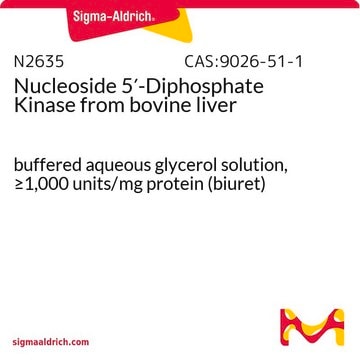C9755
Cytidine 5′-diphosphate sodium salt hydrate
from yeast, ≥95%
Synonym(s):
CDP sodium salt hydrate
About This Item
Recommended Products
biological source
yeast
Quality Level
Assay
≥95%
form
powder
storage temp.
−20°C
SMILES string
[Na].NC1=NC(=O)N(C=C1)C2OC(COP(O)(=O)OP(O)(O)=O)C(O)C2O
InChI
1S/C9H15N3O11P2.Na.H/c10-5-1-2-12(9(15)11-5)8-7(14)6(13)4(22-8)3-21-25(19,20)23-24(16,17)18;;/h1-2,4,6-8,13-14H,3H2,(H,19,20)(H2,10,11,15)(H2,16,17,18);;
InChI key
MAGSIBHRUIBONY-UHFFFAOYSA-N
Related Categories
General description
Application
- as a substrate in nucleoside diphosphatase (NDPase) enzyme histochemistry assay of gold fish eye sections
- in ribonucleotide reductase assay
- dCDP formation assay.
Biochem/physiol Actions
Storage Class Code
11 - Combustible Solids
WGK
WGK 3
Personal Protective Equipment
Choose from one of the most recent versions:
Certificates of Analysis (COA)
Don't see the Right Version?
If you require a particular version, you can look up a specific certificate by the Lot or Batch number.
Already Own This Product?
Find documentation for the products that you have recently purchased in the Document Library.
Customers Also Viewed
Protocols
ZIC®-cHILIC is a densely bonded zwitterionic stationary phase with phosphorylcholine functional groups covalently attached to silica.
ZIC®-cHILIC is a densely bonded zwitterionic stationary phase with phosphorylcholine functional groups covalently attached to silica.
ZIC®-cHILIC is a densely bonded zwitterionic stationary phase with phosphorylcholine functional groups covalently attached to silica.
ZIC®-cHILIC is a densely bonded zwitterionic stationary phase with phosphorylcholine functional groups covalently attached to silica.
Our team of scientists has experience in all areas of research including Life Science, Material Science, Chemical Synthesis, Chromatography, Analytical and many others.
Contact Technical Service
















